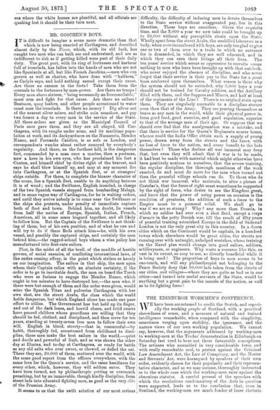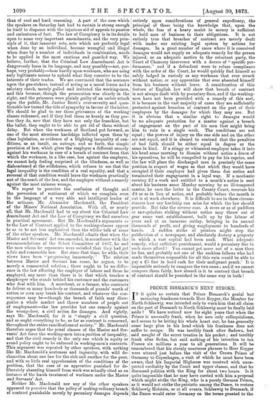THE EDINBURGH WORKMEN'S CONFERENCE.
WE have been accustomed to credit the Scotch, and especi- ally the working people of Scotland, with a practical shrewdness of sense, and a measure of natural and trained intelligence remarkable, when compared with the simplicity, sometimes verging upon stolidity, the ignorance, and the narrow views of our own working population. We cannot say, however, that the arguments addressed by working-men to working-men at the Trades' demonstration in Edinburgh on Saturday last tend to bear out these favourable conceptions. The artisans who assembled in very considerable force, and with really remarkable zeal, to protest against the Criminal Law Amendment Act, the Law of Conspiracy, and the Master and Servants' Act, were harangued by speakers of their own order, evidently chosen for their popularity and their represen- tative character, and as we may assume, thoroughly instructed as to the whole case which the working-men raise against the obnoxious statutes. A careful perusal of the speeches with which the resolutions condemnatory of the Acts in question were supported, leads us to the conclusion that, even in Scotland, the working-men are much fonder of loose rhetoric than of cool and hard reasoning. A part of the case which the speakers on Saturday last had to sustain is strong enough in itself to dispense with the injurious aid of appeals to passion and caricatures of fact. The law of Conspiracy is in its details open to some very important amendments, and the very prin- ciple of it, that innocent acts, acts which are perfectly legal when done by an individual, become wrongful and illegal when done by a number of individuals in combination, needs to be applied in the most cautious and guarded way. We believe, further, that the Criminal Law Amendment Act is dangerously loose in its language, and may possibly—not, per- haps, very probably—bear hardly upon workmen, who are using only legitimate means to uphold what they conceive to be the interests of their trades. We are convinced that the sentence upon the gas-stokers, instead of acting as a moral lesson and a salutary check, merely galled and irritated the working-men, and this because, though the prosecution was clearly in the right, and the prisoners were plainly guilty of an unfair attack upon the public, Mr. Justice Brett's over-severity and ques- tionable law turned the tide of sympathy in favour of the latter. We should be glad to see these grievances of the working classes redressed, and if they feel them as keenly as they pro- fess they do, now that they have not only the franchise, but the ballot, they ought to be able to get rid of them without delay. But when the workmen of Scotland put forward, as one of the most atrocious hardships inflicted upon them by class legislation, as evidence of a blighting inequality of con- ditions, as an insult, an outrage, and so forth, the simple provision of law, which gives the employer a different remedy against his workman in case of a breach of contract from that which the workman, in a like case, has against the employer, we cannot help feeling surprised at the blindness, as well as disheartened at the selfishness, which refuses to see that the legal inequality is the condition of a real equality, and that a reversal of that condition would leave the workmen practically out of the reach of the law, and the employer without a remedy against the most ruinous wrongs.
We regret to perceive the confusion of thought and the perversion of sentiment of which we complain even in the language of a very able and intelligent leader of the artisans, Mr. Alexander Macdonald, the President of the Miners' National Association. With all, or nearly all, that Mr. Macdonald had to say about the Criminal Law Amendment Act and the Law of Conspiracy we find ourselves in practical agreement. But Mr. Macdonald's arguments as to the Law of Contract applied to the working-classes appear to us to be not less sophistical than the wilder talk of some of the other speakers. Mr. Macdonald admits that when the Master and Servants' Act was amended, in accordance with the recommendations of the Select Committee of 1867, he and the men whom he represents were satisfied that they had got a fair and reasonable law. But since that time, he adds, their views have been "progressing immensely:' The relation between Master and Servant has come, he argues, to be merely a commercial relation ; there ought to be no differ- ence in the law affecting the employer of labour and those he employed, any more than there is in that which touches a shopkeeper who stands behind his customer and the customers who deal with him. A merchant, or a farmer, who contracts to deliver so many hundreds or thousands of pounds' worth of cotton or corn may break his contract, and whatever the con- sequences may be—though the breach of faith may disor- ganise a whole market and throw numbers of people out of employment—the law provides but one remedy against the wrong-doer, a civil action for damages. And rightly, says Mr. Macdonald, for it is "simply a civil question, and so ought everything to be, so far as contract is concerned, throughout the entire ramifications of society." Mr. Macdonald therefore urges that the penal clauses of the Master and Ser- vants' Act force the working-men into a position of inequality, and that the civil remedy is the only one which in equity or sound policy ought to be enforced in working-men's contracts. This argument was repeated by other speakers, with nothing like Mr. Macdonald's acuteness and ingenuity, with wild de- clamation about one law for the rich and another for the poor, and with so little real apprehension of the conditions of the problem, that the case of an apprentice punished for de- liberately absenting himself from work was actually cited as an instance of the harsh treatment of workmen under the Master and Servants' Act.
Neither Mr. Macdonald nor any of the other speakers appeared to perceive that the policy of making ordinary breach of contract punishable merely by pecuniary damages depends
entirely upon considerations of general expediency, the principal of these being the knowledge that, upon the whole, the fear of a heavy mulct in money is sufficient to hold men of business to their obligations. It is not entirely true that breaches of contract are merely dealt with under our existing legal system by actions for damages. In a great number of cases where it is conceived damages would not supply an adequate remedy for the person injured, or an adequate motive to the reluctant party, the Court of Chancery intervenes with a decree of "specific per- formance," and if a defendant were to refuse compliance with the order of the Court, he would quickly find himself as safely lodged in custody as any workman that ever struck without notice, or any apprentice that ever absented himself from his business without leave. A consideration of this feature of English law will show that breach of contract is not always dealt with by pecuniary fines, and if the working- men have not been provided with a remedy of this sort,. it is because in the vast majority of cases they are sufficiently protected against breaches of contract on the part of their- employers by the damages for which they may sue. But it is obvious that a similar right to damages would be no adequate protection for a master against a breach of engagement on the part of his men that might bring- him to ruin in a single week. The conditions are not equal ; the powers of injury on the one side and on the other are not equal, and it is absurd to contend that the penalties of bad faith should be either equal in degree or the same in kind. If a stingy or whimsical employer takes it into his head some morning to dismiss without notice a dozen of his operatives, he will be compelled to pay for his caprice, and the law will place the discharged men in precisely the same position in respect of wages as that which they would have occupied if their employer had given them due notice and terminated their engagement in a legal way. If a mechanic- earning £2 a week and entitled to a month's notice is sent about his business some Monday morning by an ill-tempered master, he sues the latter in the County Court, recovers his £8 or so in lieu of notice, and probably before the month is out is at work elsewhere. It is difficult to see in these circum- stances how any hardship can arise for which the law should provide. But take the reverse case. A score or so of puddlers or saw-grinders striking without notice may throw out of gear some vast establishment, built up by the labour of years and at an immense outlay, bringing in its annual thousands of profit, and giving employment to hundreds of hands. A sudden strike of printers might stop the publication of a newspaper, and absolutely destroy a property in which a vast capital had been sunk. What adequate remedy, what sufficient punishment, would a pecuniary fine in such cases afford ? You cannot get more out of a man than he has, and probably not one of the reckless fellows who had made themselves responsible for all this ruin would be able to pay a £5 fine in hard cash for their malignant prank: It is- impossible seriously to compare the two cases ; and, if we cannot compare them fairly, how absurd is it to contend that breach, of contract should be punished in the same way in both !































 Previous page
Previous page